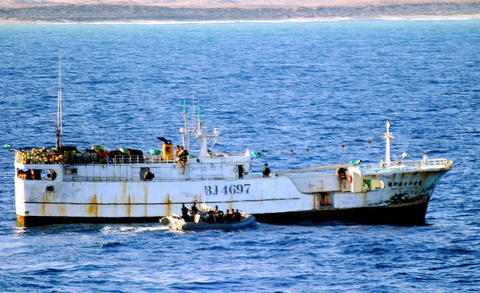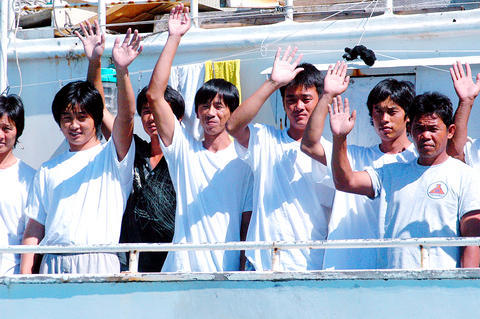With one murdered crewman in the ship's freezer and Somali pirates threatening to execute his son, Captain Lin Sheng-hsin (林勝信) could think of only one thing to do: threaten to throw himself into the shark-infested waters.
Four pirates immediately rushed to keep him from jumping from the fishing vessel.
"It was a test. I wanted to see how much the pirates valued me .... They know if the captain dies, they will get less ransom," the 47-year-old said in an interview this week, safe in Kenya after the US Navy forced the pirates to release the Ching Fong Hwa 168 and its surviving crew, including Lin's 22-year-old son.

PHOTOS: AP
Lin's tale of seven months of detention by pirates on his own ship is frighteningly common off Somali, a part of the world where high seas crime is on the increase. The pirates made off with an unspecified ransom paid by the owner of the ship.
But Lin's story has a twist. After even more ransom was demanded, the US Navy stepped in, forcing the pirates to release the Ching Fong Hwa 168 and its surviving crew.
A Navy spokeswoman said such intervention would continue in response to the spike in piracy in the region.

PHOTO: AP
"The worst time for me was the times they took my son ... they used this boy," Lin said, gesturing at the shaggy-haired Lin Shang-yu (
"They threatened me, said if I didn't call Taiwan they would shoot my son," he said.
Although there has been a spate of pirate attacks off the lawless coast of war-ravaged Somalia -- 26 so far this year, up from eight during the same period last year, the International Maritime Bureau says -- deaths are rare, says Andrew Mwangura, head of the East Africa Seafarers' Assistance Program.
"Most of the time the pirates want money, not to kill people," he said.
Ransoms can reach millions of dollars.
Somalia is deeply impoverished and flooded with weapons. It has long been without a central government with much authority on land, let alone the means to police its long coast. And now, the shaky government is busy battling an Islamic insurgency.
Pirates are often trained fighters linked to the clans that have carved Somalia into armed fiefdoms.
They have heavy weapons and satellite navigation equipment, and have seized merchant ships, aid vessels and even a cruise ship.
Lin's encounter with Somali pirates began one sunny April afternoon, when about 15 of them stormed aboard armed with automatic rifles, machine guns and rocket propelled grenades. Lin's crew was unarmed, and one member was shot in the back. He survived, but when negotiations with the ship's Taiwanese owners were going badly, the pirates executed Chen Tao, 32, from China.
"He was very unlucky because they just took him at random," recalled Lin, who had worked with Tao for two years.
He remembers the young sailor being grabbed out of a lineup, then the six shots that rang out on the other side of the boat.
"We were in shock," muttered the weathered captain, one dragon-tattooed arm reaching up to smooth a sprinkling of white hair.
"Just for money they took a life ... they are not human," he said
"After they shot that guy, I was really afraid," said Lin Shang-yu, reaching out to refill his father's sake glass.
Four crew members were ordered to drag the bloody body into the ship's freezers, where Lin insisted it stay. The pirates wanted to throw it to the sharks.
Over the next few months, the crew battled scurvy when their vegetables ran out, endured frequent mock executions and occasional beatings from guards when the Chinese, Taiwanese and Filipino crew didn't understand orders in Somali and broken English.
The pirates also forced crew members to call home, in hopes the families would pressure the ship's owners to pay the ransom. Lin listened to his wife weep for her son and husband.
Eventually, Lin explained through a translator, the ship's owners paid up last month -- the pirates had demanded US$1.5 million, but Lin refused to say how much was paid.
Everyone thought they were going home, but the pirates held out for more money. That's when the Americans got involved.
The US Navy said its personnel spoke with the pirates by radio, pressing them to leave.
They did so on Nov. 5, by skiffs that took them to shore. Then a US Navy vessel escorted Lin's ship out of Somali waters and provided its crew food and medical assistance.
Lin, who speaks no English, was unclear on who had helped, saying he believed "UN" forces as well as the US military was in the area because of the pirate activity.
US officials won't say exactly what they said to persuade the pirates to leave. But earlier, a US vessel had fired on pirate skiffs tied to a Japanese-owned ship.
At one point in recent months, at least seven ships were being held. Now, following US intervention, only two remain in pirate hands.
US Navy spokeswoman Lydia Robertson said: "Since we were there when the ships were pirated it was an opportunity for us to stay there and help free the ships."
Indonesia remains the world's worst piracy hotspot, with 37 attacks in the first nine months of this year, the International Maritime Bureau said.
Pirate activity is on the rise, with the biggest increases off Africa, and particularly Somalia.
On Wednesday, the crew of the Ching Fong Hwa 168 tucked into lobsters and chicken at the Chinatown restaurant in downtown Mombasa.
Their ship was safely in port, their families had been informed, and the men were enjoying their first taste of freedom -- and sake -- in over half a year.
"To freedom," toasted one man in Bermuda shorts and cheap plastic flip flops.
Another replied, "To home."

PRAISE: Japanese visitor Takashi Kubota said the Taiwanese temple architecture images showcased in the AI Art Gallery were the most impressive displays he saw Taiwan does not have an official pavilion at the World Expo in Osaka, Japan, because of its diplomatic predicament, but the government-backed Tech World pavilion is drawing interest with its unique recreations of works by Taiwanese artists. The pavilion features an artificial intelligence (AI)-based art gallery showcasing works of famous Taiwanese artists from the Japanese colonial period using innovative technologies. Among its main simulated displays are Eastern gouache paintings by Chen Chin (陳進), Lin Yu-shan (林玉山) and Kuo Hsueh-hu (郭雪湖), who were the three young Taiwanese painters selected for the East Asian Painting exhibition in 1927. Gouache is a water-based

Taiwan would welcome the return of Honduras as a diplomatic ally if its next president decides to make such a move, Minister of Foreign Affairs Lin Chia-lung (林佳龍) said yesterday. “Of course, we would welcome Honduras if they want to restore diplomatic ties with Taiwan after their elections,” Lin said at a meeting of the legislature’s Foreign Affairs and National Defense Committee, when asked to comment on statements made by two of the three Honduran presidential candidates during the presidential campaign in the Central American country. Taiwan is paying close attention to the region as a whole in the wake of a

A magnitude 4.1 earthquake struck eastern Taiwan's Hualien County at 2:23pm today, according to the Central Weather Administration (CWA). The epicenter of the temblor was 5.4 kilometers northeast of Hualien County Hall, at a depth of 34.9 km, according to the CWA. The earthquake's intensity, which gauges the actual effect of a temblor, was the highest in Hualien County, where it measured 2 on Taiwan's 7-tier intensity scale. The quake also measured an intensity of 1 in Yilan county, Taichung, Nantou County, Changhua County and Yunlin County, the CWA said. There were no immediate reports of damage or injuries.

OFF-TARGET: More than 30,000 participants were expected to take part in the Games next month, but only 6,550 foreign and 19,400 Taiwanese athletes have registered Taipei city councilors yesterday blasted the organizers of next month’s World Masters Games over sudden timetable and venue changes, which they said have caused thousands of participants to back out of the international sporting event, among other organizational issues. They also cited visa delays and political interference by China as reasons many foreign athletes are requesting refunds for the event, to be held from May 17 to 30. Jointly organized by the Taipei and New Taipei City governments, the games have been rocked by numerous controversies since preparations began in 2020. Taipei City Councilor Lin Yen-feng (林延鳳) said yesterday that new measures by